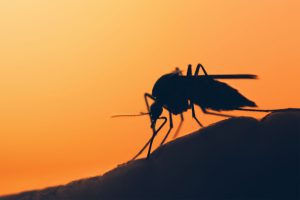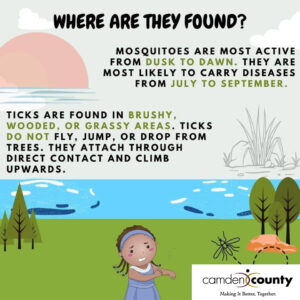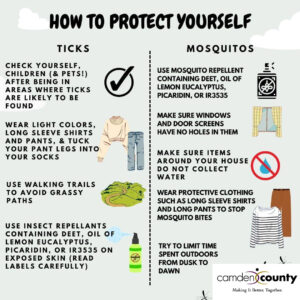 The Camden County Mosquito Commission is a health-related agency authorized by New Jersey State Statues to eliminate and control mosquitoes which cause great suffering, economic loss and disease transmission. This work is funded by the Camden County Board of Commissioners. These tasks are undertaken by employing various methods, such as chemical control, biological means, water management, education, and training by a small but highly specialized professional staff.
The Camden County Mosquito Commission is a health-related agency authorized by New Jersey State Statues to eliminate and control mosquitoes which cause great suffering, economic loss and disease transmission. This work is funded by the Camden County Board of Commissioners. These tasks are undertaken by employing various methods, such as chemical control, biological means, water management, education, and training by a small but highly specialized professional staff.
Mosquitoes are well known throughout the area as a nuisance. Uncontrolled mosquito populations can still ruin outdoor activities and interfere with many elements of business. A less common but even more serious problem with the blood sucking of mosquitoes is the spread of diseases. Mosquito borne illnesses spread to people by the bite of an infected mosquito. Examples include West Nile Virus (WNV) or Eastern Equine Encephalitis (EEE) virus. The season for mosquito borne illness is summer through early fall. Various types of life-threatening encephalitis occur throughout South Jersey in humans and domestic animals. Dog heartworm is widespread in dogs and occasionally in cats. Malaria has struck in Camden County in recent years but is very rare. Some of the most serious communicable diseases are spread by a mosquito bite and are still common in many other parts of the world. These are all reasons that the mosquito is a pest of whose control is mandated by New Jersey State Law.
Since the mosquito does not respect property lines, municipal borders or land features, this commission serves all parts of Camden County and is coordinated with neighboring counties through a state network.
To report a mosquito issue in your town, please click here.
*Please note when an issue is reported the Mosquito Commission will spray the street and surrounding areas, they are not permitted to spray private residences.
How to Avoid Tick Bites
A tick that is infected with certain types of bacteria can bite people and cause them to become sick. You can reduce the risk of getting diseases from ticks by taking steps to avoid getting bitten by a tick.
- Avoid wooded areas with dense shrubs and leaf litter, where ticks like to hide.
- Make your yard less attractive to ticks by mowing lawns and trimming trees.
- Wear solid, light-colored clothes. This will make it easier to find a tick on your clothes.
- Tuck your pants into your socks and wear a long-sleeved shirt. This will help prevent a tick from attaching to your skin.
- Use insect repellents (bug spray) on yourself and your pets. There are two types of repellents effective for ticks. Repellents that contain DEET can be used on clothes and exposed skin. The other type of repellent contains permethrin and should ONLY be used on clothes. Always read and follow label directions carefully.
- Check yourself for ticks frequently when you are in tick-infested areas. Check again after returning and again before going to bed. Don’t overlook some of ticks’ favorite hiding places—on the scalp, behind the ears, under the arms, on the ankles, and in the groin area.
How to Remove a Tick
The best time to get a tick off your body is before it bites. If you have been in areas where ticks live, be sure to look closely all over your body to see if any are moving around. Simply use a tissue to grab the tick and throw dead ticks in the trash. Do not squeeze or crush a tick with your bare hands.
If you find a tick and it has already bitten you, follow these steps:
- Use tweezers to grasp the tick by its head (not just the body). Grasp the tick as close to your skin as possible.
- Pull steadily until the tick pulls out (expect to feel some resistance)
- After removing the tick, clean the bite area and tweezers with alcohol.
- Wash your hands with soap and water.
How to safely throw away a tick:
- Place a live tick in a sealed container or sealed plastic bag to prevent it from escaping.
- Place the container or bag in the trash.
- Do not flush ticks down the toilet because they can easily survive in the water.
Access the Center for Disease Control’s new Tick Bite Bot!
The Tick Bite Bot is a free, easy, interactive tool that assists its’ users in properly removing a tick, as well as where and when, if need be, to seek medical attention: https://www.cdc.gov/ticks/removing-a-tick/tick-bite-bot.html
For additional information, visit:
Mosquito Commission | Camden County, NJ
Fight the Bite | Fight the Bite | CDC


